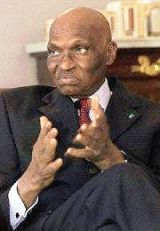Senegal wants security guarantees for Darfur force
August 1, 2007 (DAKAR) — Senegal will send additional soldiers to Sudan’s Darfur region as part of a new U.N.-African Union peacekeeping mission provided they have a clear right to defend themselves, the country’s president said on Wednesday.
 The U.N. Security Council on Tuesday authorised up to 26,000 troops and police for Darfur and approved the use of force to protect civilians against violence which has driven more than 2.1 million people from their homes over the past four years.
The U.N. Security Council on Tuesday authorised up to 26,000 troops and police for Darfur and approved the use of force to protect civilians against violence which has driven more than 2.1 million people from their homes over the past four years.
Infantry soldiers will be drawn mainly from African nations if enough can be recruited. The mission will incorporate the under-equipped and under-financed 7,000 African Union troops already in Darfur, including 600 Senegalese soldiers and police.
“I think this is a good resolution,” Wade told Reuters in an interview in his presidential palace in Dakar.
“Senegal is ready to increase the size of its contingent in Darfur on the condition that they are able to defend themselves,” said Wade, who has been involved in the international negotiations with Sudan.
One of Wade’s advisors said the former French colony, whose peacekeeping troops are widely respected in Africa, was ready to send an extra 260 soldiers and 140 military police to Darfur.
Senegal had in the past threatened to withdraw from the overstretched African Union peacekeeping force in Darfur unless it was given firm U.N. backing, echoing similar statements by Rwanda, another contributor to the Darfur force.
The U.N. resolution authorises the operation to take “necessary action” to protect its personnel, facilities, installations and equipment but Senegal has already lost five soldiers in Darfur and wants greater clarity over their rights.
“The Sudanese have agreed that the soldiers can be armed in order to defend themselves but that is not in the U.N. Security Council resolution. The Security Council didn’t want to pass a resolution which imposes war,” Wade said.
He added that the hybrid force would be under African command and would begin deploying in October. One detail still to be sorted out was what the soldiers would wear on their heads, which Wade said was a weighty symbolic issue.
“There’s an important issue with the berets as it is a hybrid force,” he said. “The Africans want to keep their green berets while the others want the blue berets of the United Nations.”
(Reuters)
